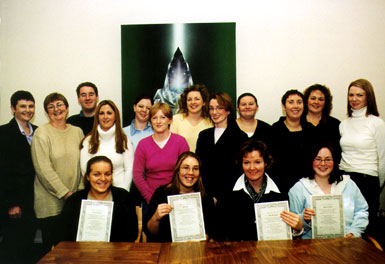| 2003 |

|
YEAR BOOK |
Waterford Institute of Technology
|
Department of Physical and Quantitative Sciences
|

The Optics Research Group
The Optics Research Group is engaged in research in optical fibre interferometry. Optical fibres are best known for their application in modern telecommunications. Optical fibre interferometry is used to make critical measurements on the way light propagates within such fibres, and also within laser and photonic glasses and devices. In complementary research programs, the application of these fibres as advanced sensors is studied.
The group has active collaborations with research institutes in the UK and US, and publishes widely in the international literature. It has received funding from Enterprise-Ireland (under the Strategic Research, Applied Research and International Collaboration programs), from the TSR (Technology Sector Research) Strand I program, and from the Royal Society, Royal Irish Academy and the British Council. The group's website is maintained at www.wit.ie/research/org
The Telecommunications Software and Systems Group
The Telecommunications Software and Systems Group is the largest research group in WIT. Established in 1997 by Dr Willie Donnelly, the group specialises in the area of telecommunications and emerging architectures for the management of complex telecommunication systems. It has special expertise in the area of distributed object technologies and web-based solutions, and applies these skills within the telecommunications domain, and other related thematic areas. The group is establishing a National Telecommunications Services Research Centre under the Science Foundation Ireland Centres for Science, Engineering, and Technology: Campus-Industry Partnerships. The Centre will focus on the emerging telecommunications networks (wireless & wireline) and the software services that will be deployed on these networks. More details are available at www.tssg.org .
The Information Systems and Organisational Learning Research Unit
Formed in 2001, this is one of the fastest growing research groups in WIT. It currently has eighteen researchers, and is involved in six funded international projects with leading institutions in ten countries. During 2002, the group engaged with forty firms in national and international research activities. It maintains a strong research collaboration with the Josef Stefan Research Institute in Slovenia, and also works with the Bulgarian Institute of Computer and Communications Systems in Sofia. Other research links have been established with centres in Latvia and Estonia. The group's founder, Dr Larry Stapleton, is Vice Chair of the International Committee of the International Federation of Automation and Control. Further details can be obtained from http://emhain.wit.ie/ISOL/
The Centre for Automotive Research
The Centre for Automotive Research was established at WIT in 2000 by Henry Acheson, Brendan Jackman and John Manning to carry out research, consultancy and training in electronic and software systems applicable to automotive applications. The Centre brings together a broad range of complementary skills from the automotive, computing and electronic backgrounds of its founding members. The group has specialist knowledge in the areas of automotive diagnostics, body- and engine-control systems and vehicle networks (CAN, LIN etc), and has a number of post-graduates working in these areas. Since its establishment, the group has become internationally recognised as a source of highly skilled post-graduates and consultancy to the automotive industry. A number of researchers with the Centre have taken up key R&D positions with some of the leading European automotive companies. More information and contact details are available at www.wit.ie/car .
The WIT eLearning Group
Founded in 1998, this group carries out collaborative research in eLearning systems. It has strong links within the European Minerva programme with educational research partners in Scotland, Iceland, Norway, Finland and Latvia. Two major projects have been carried out to date, investigating and evaluating appropriate platforms for the on-line delivery of teaching modules to students and practitioners in the fields of early childhood education and social care. Other recent research has covered systems support for science and mathematics education, and systems to support literacy teaching.
The WIT Mathematics Group
The WIT Mathematics Group maintains a high level of research related activity. In addition to publications and organising a Seminar series, its researchers undertake research and consultancy in applied mathematics and statistics. Current funded projects include the development of parallel algorithms for stochastic Volterra equations, and the investigation of the geometry of Banach spaces. Other areas of interest are in computer graphics and visualisation, the mathematics of Celtic Art, and mathematical education.
The Semiconductor Physics Group (SPG)
The Semiconductor Physics Group (SPG) is concerned with the study of defect formation mechanisms in semiconductors, using a number of experimental techniques, and has strong links with the University of Augsbury (DE), Trinity College Dublin, and the University of Limerick. Materials investigated include alternative semiconductor materials such as Silicon Germanium and Gallium Nitride, as well as conventional Silicon. The SPG is co-ordinated by experimentalist Dr C. O'Raifeartaigh. The group publishes research results regularly in international journals such as the Journal of Applied Physics and the Journal of Physics B; Nuclear Instruments and Methods.
Contact: Paul Barry, Head of Department of Physical & Quantitative Sciences; Waterford Institute of Technology;
Tel:+ 353 (0)51 302027; E-mail: [email protected]